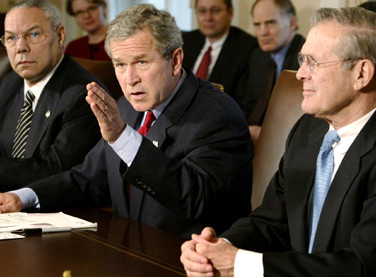DREAM TEAM: President Bush speaks to the press about establishing an
independent investigation into intelligence failures in Iraq on February 2,
2004 in Washington, D.C. Bush is surrounded from left to right, Secretary of
State Colin Powell and Defense Secretary Donald Rumsfeld.
Up until the beginning of last week, the Bush administration pretty much had its way with the American media. Whatever policy position President Bush enunciated to the American public through the press, whatever spin on events the White House promoted on any given event, was pretty much reported verbatim — without comment, philosophical reflection, or investigation as to the veracity of the information — by the American press and was printed, or broadcast, untrammeled, and edited in such as way as to preserve the imperial nature of the Presidency.
No more.
With the publication, last Monday, of the Abu Ghraib pictures of Iraqi prisoners being tortured by American troops internecine warfare began to break out in the once closed ranks of the Bush administration.
In the latest issue of Time, the magazine’s Washington-based reporters report that those who surround Bush are finding it increasingly difficult to present a positive message, as finger-pointing has taken the place of “keeping on message.”
Top Bush officials griped about what one called Rumsfeld’s “destructive arrogance.” Says the adviser: “You have no idea what it’s like to deal with the United States of Rumsfeld.” Colin Powell’s closest aides, like chief of staff Larry Wilkerson, were quoted in GQ magazine, saying that Powell was weary of fighting ideological “utopians” in the Administration and being forced to do “damage control” and “apologizing around the world.” Powell’s foes, perhaps in retaliation, blamed him for being slow to decide to travel to the Middle East to help quell the furor over the abuse scandal. Says a senior Bush official of the open warfare: “It is not very conducive to a healthy working environment.”
The White House will surely try to regroup, but it is appearing increasingly obvious that a wholesale purge of the senior ranks of the Bush administration will become necessary if Bush is to have any reasonable chance at a second term in office.
